Events
Lithuanian and Taiwanese Scientists Strengthen Cooperation
20 02 2023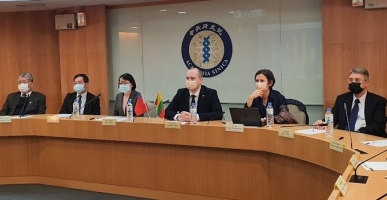
With the aim to expand and strengthen scientific cooperation between Lithuania and Taiwan, a delegation of Lithuanian scientists led by Gintautas Jakštas, vice-minister of education, science and sport of the Republic of Lithuania, visited Taiwan’s research and study institutions on 2–8 February 2023. The delegation included as many as four full members of the Lithuanian Academy of Sciences: President Jūras Banys, Vice President Zenonas Dabkevičius, and the scientists of Vilnius University Virginijus Šikšnys and Romas Baronas, who, together with the Taiwanese researchers, presented the achievements of science of their respective countries and examined the opportunities for closer cooperation and intensification of scientific exchanges.
The delegation also included Jurga Strumskienė, director of the Department of International Cooperation and European Integration of the Ministry of Education, Science and Sport of the Republic of Lithuania, Prof. Daumantas Matulis and Prof. Gintaras Valinčius, both of the Life Sciences Centre of Vilnius University. Prof. Da-Chuan Cheng, director of the Science and Technology Division of the Taiwanese Mission in Lithuania, accompanied the delegation during this visit.
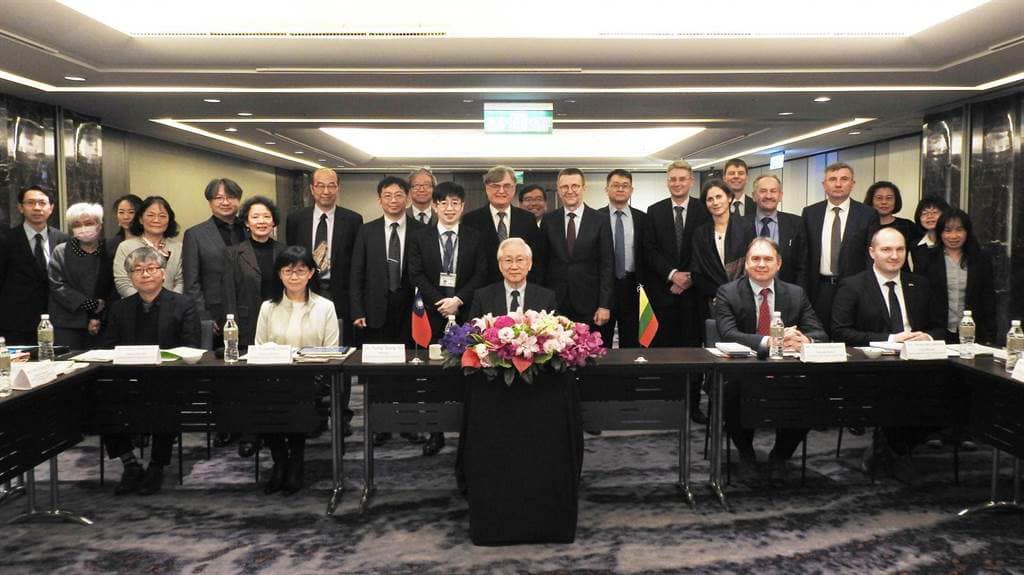
The Lithuanian delegation, together with the representatives of the National Research and Technology Council of Taiwan (ROC) and other institutions.
Sitting, left to right: Prof. Minn-Tsong Lin, vice-minister of the National research and Technology Council, Prof. Yi-Juang Chern, vice-minister, prof. Tsung-Tsong Wu, minister, Paulius Lukauskas, head of the Lithuanian Trade Representative Office in Taiwan, and Gintautas Jakštas, vice-minister of education, science, and sport of the Republic of Lithuania.
On the first day of the visit, Lithuanian and Taiwanese researchers reviewed the areas for the development of scientific and technological cooperation and possible joint activities. The meeting was attended by prof. Tsung-Tsong Wu, minister of the National Science and Technology Council of Taiwan (ROC), Prof. Yi-Juang Chern and Prof. Minn-Tsong Lin, vice-ministers, Tom Chih-Cheng Yeh, director general of the Department of International Cooperation and Science Education, and by the representatives of the National Taiwan University and Academia Sinica of Taiwan. Considerable attention was paid to cooperation in the fields of laser technology and biotechnology, particularly in genetic engineering.
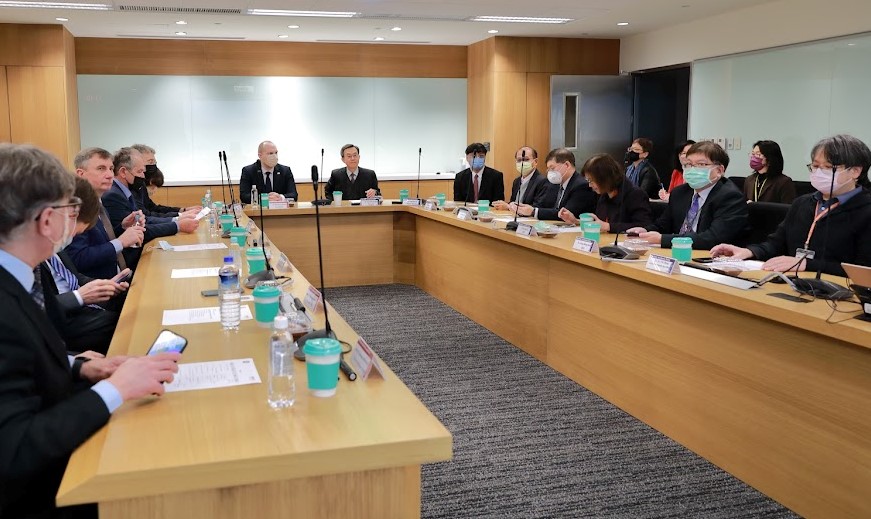
Lithuanian and Taiwanese scientists discussing the opportunities of bilateral cooperation.
Prof. Jūras Banys, president of the Lithuanian Academy of Sciences, is pleased that the parties agreed to fund bilateral Lithuanian-Taiwanese research projects. So far, the funds were allocated for joint Lithuanian-Latvian-Taiwanese projects for research, dissemination, and other related activities. Unfortunately, it was difficult to find partners in Latvia for such projects. ‘There will be more opportunities for international inter-institutional mobility for young researchers and doctoral students. In agreement with Taiwanese scientists, Lithuanian researchers will be able to do research and engage in professional activities in Taiwanese research institutions for two years and defend their doctoral dissertations in either Lithuania or Taiwan,’ says Prof. Banys.
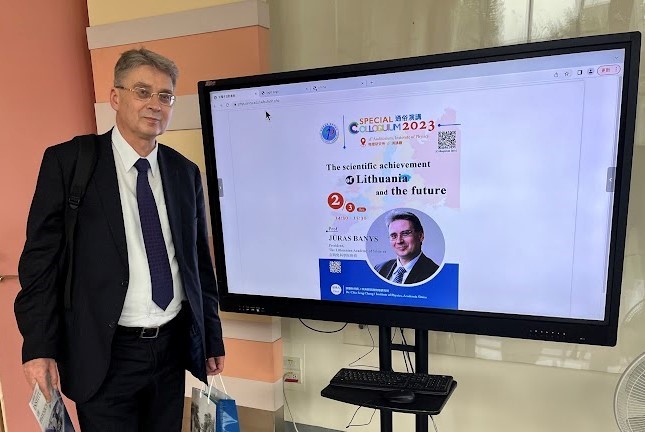
Prof. Jūras Banys, president of the Lithuanian Academy of Sciences, presents the achievements of Lithuanian science.
The Lithuanian delegation visited Academia Sinica, the Taiwanese academy of sciences comprising 24 research institutes and eight research centres, where they met and held discussions with its president, Prof. James C. Liao, and with scientists in the fields of mathematics, the physical sciences, and the natural sciences. Prof. Banys gave a presentation on the achievements of Lithuanian science and research conducted in microwaves, academician Virginijus Šikšnys spoke about the past, the present, and the future of the application of the CRISP-Cas9 genome editing technology. At the Institute of Plant and Microbial Biology, Prof. Zenonas Dabkevičius, vice-president of the Lithuanian Academy of Sciences, discussed the latest trends in agrobiological research and issues relevant to agriculture.
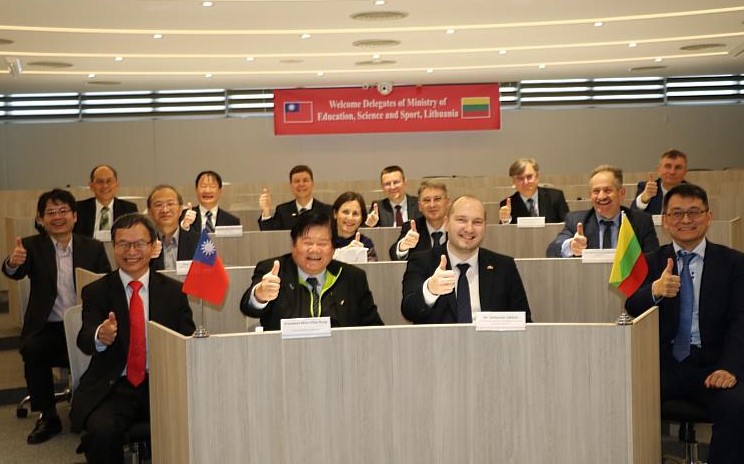
Meeting Prof. Mien-Chie Hung, an academician and president of China Medical University (first row, second left). Photo: cba.com.tw
The Lithuanian scientists continued their visit with an acquaintance with the Cancer Centre of the National Taiwan University where Prof. James Chih-Hsin Yang, head of the Cancer Centre, gave a presentation on the innovative research conducted there in the fight against cancer. At China Medical University, the delegation had a discussion with Taiwan’s most prominent oncologist, academician Prof. Mien-Chie Hung, president of China Medical University, who visited Lithuania in the autumn of 2022 and gave a lecture at the Lithuanian Academy of Sciences. The delegation were shown around the Proton Medicine Centre of the university hospital. Proton therapy is an advanced, precise, and less invasive way of treating cancer that can destroy cancer cells and effectively protect the surrounding tissues from damage. ‘Proton therapy is already applied in practice. It is very important that the medical staff of Taiwan and the Lithuanian University of Health Sciences, the National Cancer Institute, and Vilnius University Hospital Santaros Klinikos cooperate and this method of treatment reaches Lithuania as soon as possible,’ says Prof. Jūras Banys.
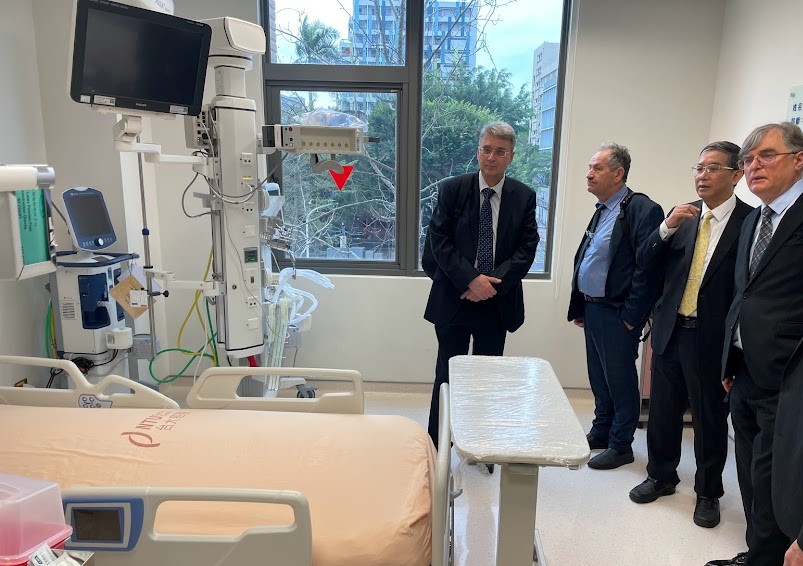
At the Cancer Centre of the National Taiwan University.
During their visit to the National Cheng Kung University, which has nine colleges, Lithuanian scientists and its president, Prof. Meng-Ru Shen, discussed potential bilateral research, exchange programmes, talent development, and industry-university collaboration. The president of the university expressed his hope to strengthen ties with European countries and expand academic cooperation. Prof. Daumantas Matulis, director of the Life Sciences Centre of Vilnius University, and Prof. Ju-Ming Wang, dean of the College of Biosciences and Biotechnology of the National Cheng Kung University, signed an academic cooperation agreement.
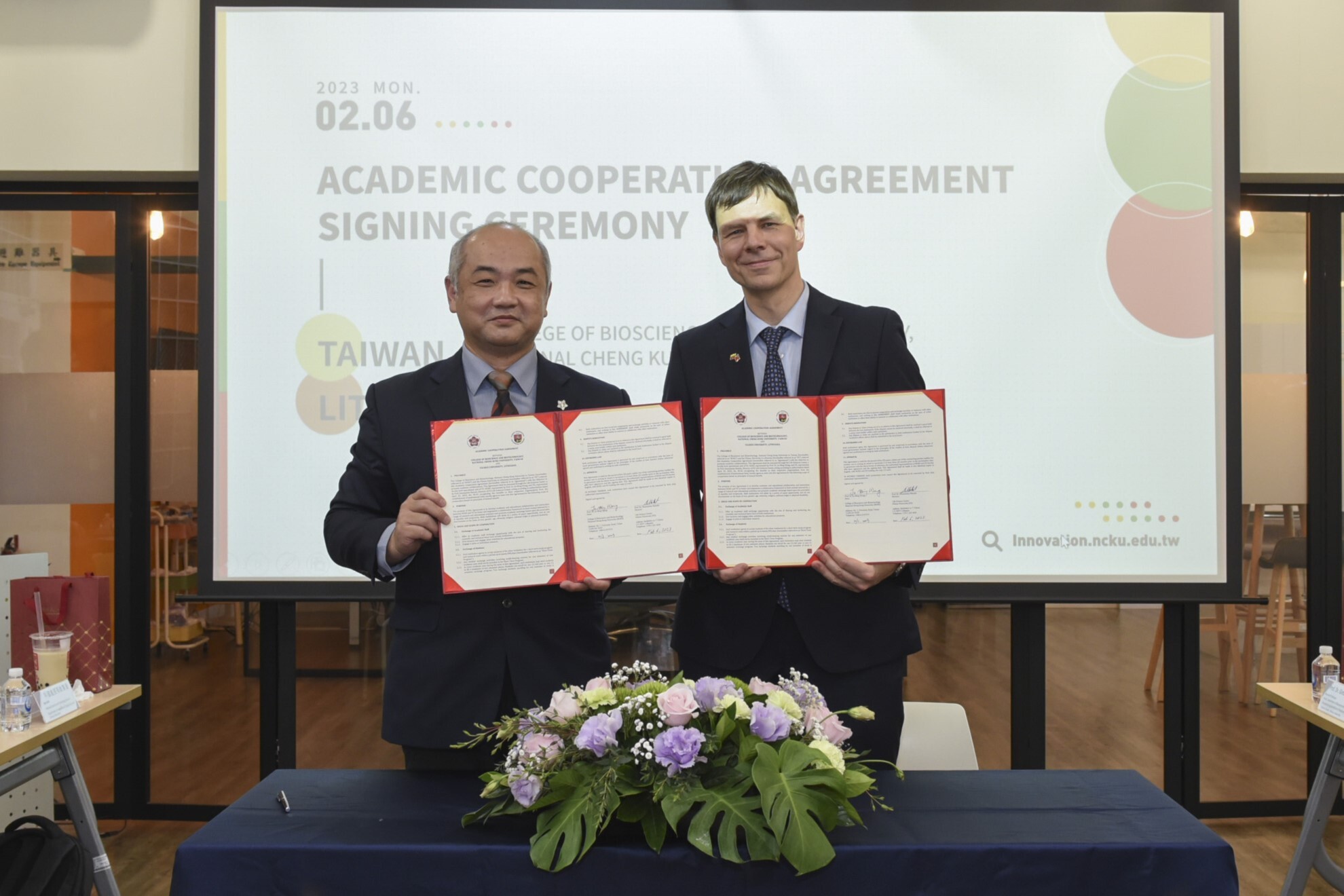
Prof. Ju-Ming Wang, dean of the College of Biosciences and Biotechnology of the National Cheng Kung University, and Prof. Daumantas Matulis, director of the Life Sciences Centre of Vilnius University, signed an academic cooperation agreement. Photo: web.cku.edu.tw
The delegation of Lithuanian scientists also participated in meetings and discussed opportunities for cooperation between the two countries with the ministers of education and foreign affairs of Taiwan as well as with the heads of other research institutes, research centres, and scientists.
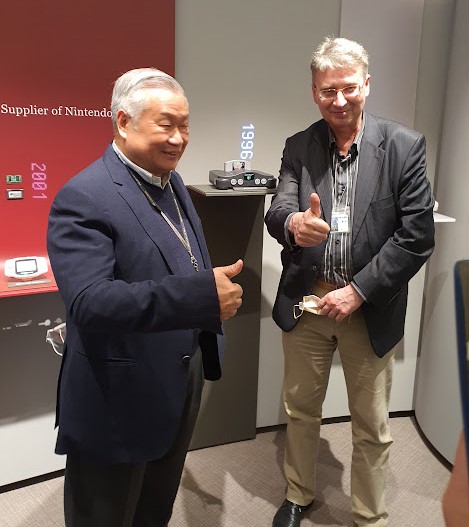
Prof. Jūras Banys and Miin Wu, chair and CEO of Macronix International Co.
The Lithuanian delegation were impressed by the Tainan, Kaohsiung, and Hsinchu science parks. For example, Hsinchu Science Park is home to some 400 high-tech companies such as semiconductor leader Taiwan Semiconductor Manufacturing Company, Macronix International Co, Logitech, Apple Inc. and others. ‘These science parks are like an ecosystem of scientific and socio-cultural life. Not only are they equipped with state-of-the-art laboratories, but they also have everything one needs for socio-cultural life: dormitories, kindergartens, schools, and leisure facilities. For example, Tainan Science Park has the Museum of Archaeology that displays bones and other finds from primitive populations unearthed during the construction of the park,’ says Prof. Banys. ‘It should be noted that the Taiwanese government financed the construction of these parks and all the infrastructure.’
